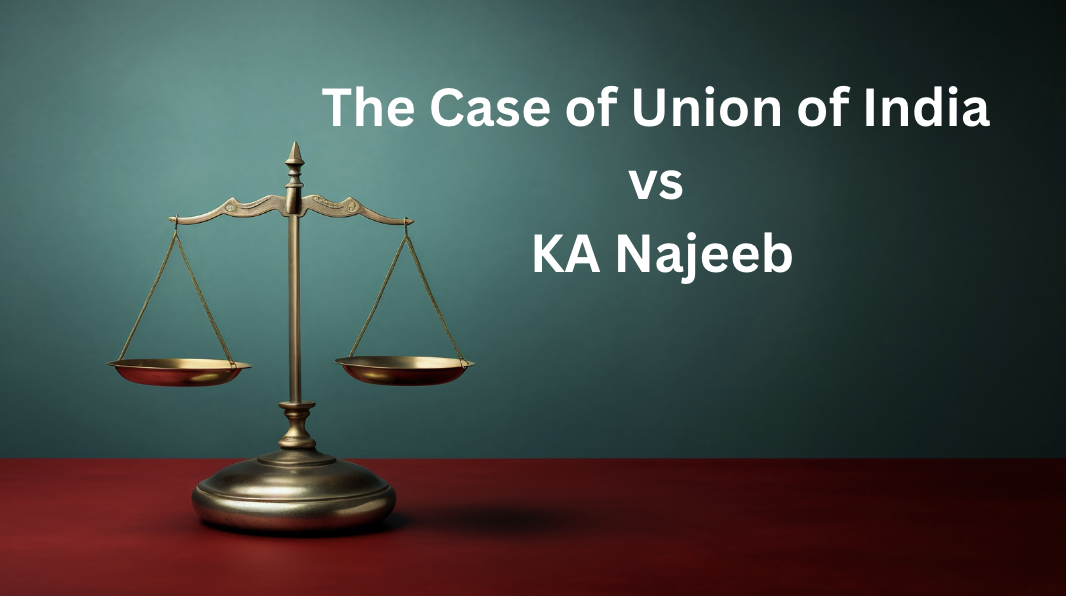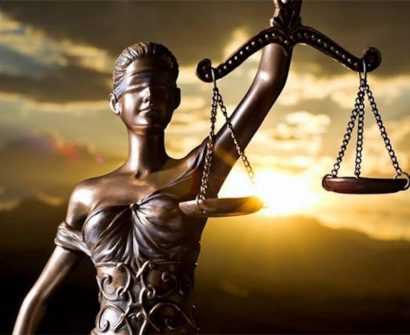
The respondent, a follower of a fundamentalist organization, was charged in the union of india vs ka Najeeb case with organizing an assault on Professor TJ Joseph in Kerala in 2010. In accordance with the Unlawful Activities (Prevention) Act (UAPA), he was taken into custody by the national investigation agency (NIA) in 2015. 2019 saw the Kerala High Court award Najeeb bail in response to the trial’s protracted delays, which the NIA contested. The NIA claimed that the NIA special court had previously rejected bail based on the UAPA rules in a special leave petition (SLP) that it filed with the Supreme Court.
The NIA argued that bail for offenses under the Act is prohibited by section 43d (5) of the uapa. In its ultimate decision, the Supreme Court rejected the NIA’s appeal, finding that the respondent’s constitutionally guaranteed right to a prompt trial had taken precedence. The court did not, however, provide a precise criterion for cases that are comparable in the future. The panel, which included Justices NV Ramana, Surya Kant, as well as Aniruddha Bose, upheld the constitutional courts’ authority to release accused parties who have been prosecuted or detained under the strict UAPA. In spite of this ruling, there are still a number of open questions about bail jurisprudence and UAPA.
union of india vs ka Najeeb Case Facts
- K.A. Najeeb (henceforth accused), an ardent member of the radical People’s Front of India (PFI), was taken into custody for organizing the prearranged attack on Professor T.J. of Joseph Newman College in Thodupuzha.
- The victim inserted a question on the preparation of the question paper that was deemed offensive to a specific faith. The accused made the decision to attack the victim in order to get revenge on him for his religious beliefs, together with other members of the radical Islamic group Popular Front of India.
- Around eight in the morning on July 4, 2010, the victim was attacked by a gang of persons using a common object as he was making his way home with his mother and sister. PFI members used cellphones, knives, and a small axe to forcefully take over the victim’s car, arrest him, and hack off his right palm during the attack. Additionally, homemade bombs were hurled at onlookers in an attempt to instill fear and terror in them and keep them from helping the victim. The victim’s wife consequently reported the attackers with the police.
- According to the inquiry, the attack was a part of a bigger plot that included the use of deadly weapons, multiple failed attempts, and extensive preplanning. As a result, the UAPA’s provisions were applied against him.
- The accused was judged to be a thief, despite the fact that the special NIA court located and punished the majority of the accused’s co-conspirators. The co-accused received sentences ranging from two to eight years in a penitentiary.
- Najeeb was then located and taken into custody by the NIA, where he remained for nearly five years without being found guilty or facing any sort of legal action.
- The accused petitioned the court for bail up to six times between 2015 and 2019, requesting parity with other co-accused who were released on bond or granted bail. Due to the accused’s direct knowledge of the attack and his facilitation of it, his plea was denied.
- Because a person prosecuted under the UAPA is not subject to standard bail procedures, courts have the authority to refuse release based on reasonable suspicion, which rendered him ineligible for bail according to section 43d (5) of the uapa. For the third time, the accused went before the Court of Appeal to contest the special court’s bail decision.
- Noting that an accused person cannot be held in custody too long, the Supreme Court granted the accused person bail along with the challenged decision. especially considering that it is doubtful that the trial will begin anytime soon and that it will cause him great anguish if it does not.
- But the court set aside the aforementioned bail ruling, and the NIA appealed, arguing that the High Court had made a mistake. Thus, the current situation.
union of india vs ka Najeeb Issues
Three main points were addressed in the aforementioned case, which are listed below:
- Is it possible for a breach of article 21 of the indian constitution to supersede the legal requirements outlined in section 43d (5) of the uapa?
- Is it the court’s responsibility to refuse bail when there is a strong suspicion that the defendant is guilty?
- Is it possible to contest the court’s bail judgment without requiring any additional justification?
Contentions by the Parties
Petitioner:
- According to the appellant, the bond amount given to the respondent in this particular case is incorrect since it does not comply with section 43d (5) of the uapa.
- The attorney emphasized that in cases when the accused is presumed to be guilty, the courts are required to deny bail requests. In the current case, it was further argued that the respondent’s years-long fleeing makes it more reasonable for the courts to deny bail.
- Finally, the attorneys in this case responded to the trial’s postponement by arguing that NIA had submitted a second affidavit that included 276 witness examinations.
Respondent:
- The respondent’s attorney emphasized that the majority of the co-accused have either been found not guilty or have received sentences of little more than eight years in jail.
- To compound the previously noted issue, the respondent had already spent more than five years in jail, which is unconstitutional in terms of Part III of the Constitution’s guarantees of equal access to justice and a prompt trial.
- Additionally, the respondent’s attorney made the case that, absent extraordinary circumstances, the Supreme Court should not get involved in a case where the High Court had granted bail to the accused.
- Finally, it was argued that the accused’s detention without charge or trial in this case infringed their right to liberty and freedom.
union of india vs ka Najeeb Judgment
- The Supreme Court supported the High Court’s decision by striking a balance between the respondent’s rights according to Part III of the Constitution as well as the appellant’s opportunity to provide ample amount of proof for the statements they are themselves making.
- In accordance with Part III of the Constitution, the defendant was granted the right to produce evidence and prove their claims beyond a reasonable doubt. As a result, it was decided that the appellant’s Special Leave Petition (SLP) was not viable.
- The court clarified that notwithstanding these legislative limitations, constitutional courts retain the authority to grant bail in cases involving violations of Article 21. section 43d (5) of the uapa may still apply in certain circumstances.
- If Part III of the Constitution is breached, Constitutional Courts are not automatically precluded from providing bail due to the existence of statutory constraints such as section 43d (5) of the uapa.
- The court noted that, in light of the legislative policy opposing bail, the strict provisions may be waived in cases where there is little chance that the trial will be concluded in a reasonable amount of time and the length of incarceration has already exceeded a substantial portion of the sentence that was prescribed.
- This method makes sure that the constitutional right to a prompt trial and other laws like section 43d (5) of the uapa aren’t the only grounds for denial of bail. When making decisions about bail requests under such statutes, it enables Constitutional Courts to strike a balance between the interests of justice and individual rights.
- In this instance, the courts have the authority to give bail in the event that the accused’s constitutional rights are infringed, even though the NIA found the accused to be guilty prima facie and section 43d (5) of the uapa permits bail denial. The Supreme Court upheld the High Court’s ruling after the court determined that there had been an infringement on the “right to speedy trial.”
- In addition, section 43d (5) of the uapa appears to be a tool for postponing bail because it does not set forth any requirements to keep the accused from committing new crimes. As a result, the Supreme Court determined that the special leave petition could not be maintained and upheld the High Court’s ruling.
The Unlawful Activities Prevention Act of 1967 was passed by the government in an effort to lessen the burden on the criminal justice system and to stop the rise in terrorist activity. Considering these incidents, it is possible to conclude that UAPA has been violating individual constitutional rights, which cannot be taken away from a citizen during a “emergency” in the nation, in addition to suppressing terrorist activity. The goal of the government should be to achieve a balance between strict regulations and constitutional rights so that citizens feel empowered rather than intimidated.
For any latest news, legal topics, judiciary exams notifications, patterns, etc watch Jyoti Judiciary’s YouTube channel for legal videos for any updates at https://youtube.com/@jyotijudiciarycoaching4852?si=2cwubh9d2A9urwJf








